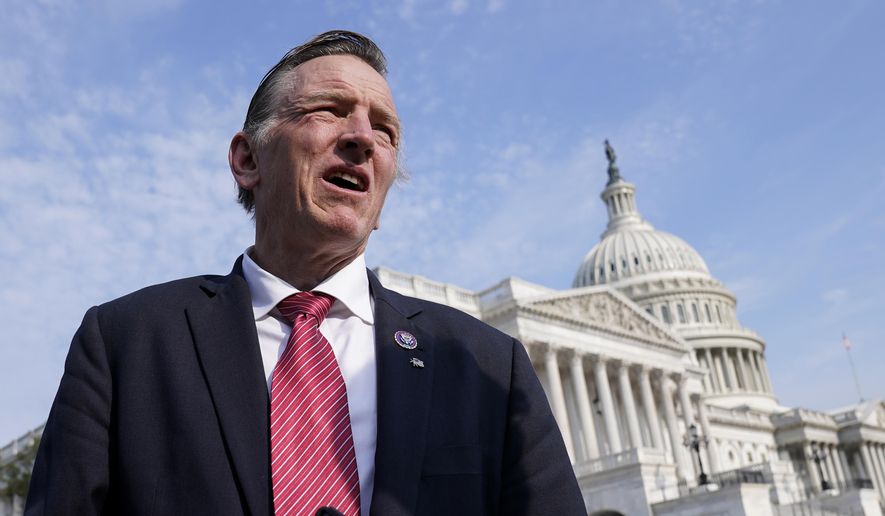PHOENIX — A judge in Phoenix has dismissed lawsuits seeking to disqualify three Republican lawmakers from this year’s ballot because they participated in or helped organize the Jan. 6, 2021, rally in Washington that led to an unprecedented attack on Congress.
The decision from Maricopa County Superior Court Judge Christopher Coury made public Friday means Reps. Paul Gosar and Andy Biggs and state Rep. Mark Finchem remain on the primary ballot barring a reversal by the state Supreme Court. Gosar and Biggs are seeking reelection and Finchem is running for Secretary of State, Arizona’s chief election officer.
The lawsuits filed on behalf of a handful of Arizona voters alleged that Gosar, Biggs and Finchem can’t hold office because they participated in an insurrection. They cited a section of the 14th Amendment to the U.S. constitution enacted after the Civil War.
None of the lawmakers are accused of participating in the actual attack on Congress that was intended to stop certification of President Joe Biden’s win.
Coury agreed with the lawmakers’ attorneys who said Congress created no enforcement mechanism for the 14th Amendment, barring a criminal conviction. He noted that Congress proposed such a law in the wake of the attack on Congress but it is not been enacted.
“Therefore, given the current state of the law and in accordance with the United States Constitution, plaintiffs have no private right of action to assert claims under the disqualification clause,” Coury wrote.
He also rejected arguments that state law created an enforcement mechanism that allows people to sue to enforce the 14th Amendment’s provision. And he said, at least for Biggs and Gosar, qualifications for member of Congress are purely a federal affair.
“The text of the Constitution is mandatory,” Coury wrote. “It sets forth the single arbiter of the qualifications of members of Congress; that single arbiter is Congress.”
The attorney representing the voters who challenged the lawmakers, Jim Barton, urged Coury on Wednesday to hold a planned three-day trial even if he dismissed the case. But Coury declined to do so, noting that election challenge cases are by definition rushed and not the proper place for such legal wrangling.
“Arizona’s election challenge framework is ill-suited for the detailed analysis of the complex constitutional, legal and factual issues presented in this case,” he wrote.
Coury noted that Gosar’s lawyer, Alexander Kolodin, raised free speech issues. And Kolodin stressed that after Friday’s ruling became public.
“If the radical left wants our courts to punish dissenting speech, they came to the wrong state,” Kolodin said.
Free Speech For People, the group representing the Arizona voters, vowed an appeal to the Arizona Supreme Court, saying Coury’s ruling “is contrary to the law.”
“Arizona is not exempted from the mandate of Section 3 of the Fourteenth Amendment to the US Constitution,” the group said in a statement. “A candidate who has taken an oath of office and then engaged in insurrection has no place on a future Arizona ballot.”
The rally where former President Donald Trump spoke and urged attendees to march on the Capitol led to deadly clashes. Protestors forced their way into Congress while lawmakers were certifying President Joe Biden’s 2020 victory.
The Arizona lawsuits are mirrored in complaints now being pursued by Free Speech for People attorneys against sitting members of Congress from Georgia and North Carolina.
Voters in Georgia are trying to get firebrand Republican and Trump supporter Marjorie Taylor Greene thrown off the ballot for similar reasons. She was in court Friday.
And voters in western North Carolina want Republican U.S. Rep. Madison Cawthorn, who spoke at the rally that preceded the riot, tossed from the ballot.
Cawthorn sued and a federal judge last month blocked the challenge filed with the state’s election board from moving forward, writing that laws approved by Congress in 1872 and 1898 mean the 14th Amendment section can’t apply to current House members.




Please read our comment policy before commenting.